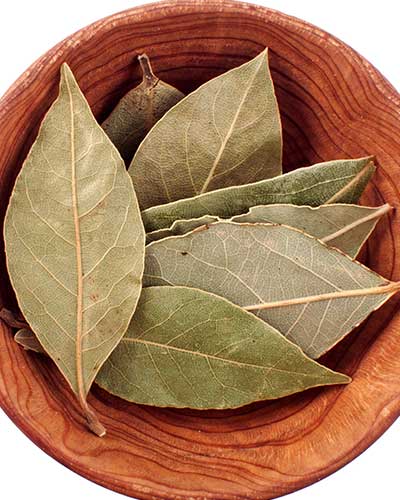Coconut Ice Cream
- 20 Apr - 26 Apr, 2024

Bay leaf provides 314 calories per 100gm; 8g fat, 8g of protein, 75g of carbohydrates, 23mg of sodium and 529mg of potassium.
· Also known as Sweet Bay and Sweet Laurel, the bay is an evergreen shrub grown in the Mediterranean climates.
· Fresh bay leaves have a mild flavour while dried leaves have a fully developed peppery flavour with floral undertones. They are used to give a distinctive flavour to soups, stews, tea, marinades and pickling solutions.
· In the ancient times, bay leaves were believed to alleviate bee and wasp stings. The Romans considered them to be a symbol of glory.
· Ancient Greeks used bay leaves to flavour foods.
· The aroma from a bay leaf can ward off insects, especially pantry moths, and they can also inhibit mould; while a special oil can be derived from the leaves, which can be used as essential oil.
· Bay leaves are high in vitamin A, vitamin C, iron, vitamin B6 and manganese.
· Bay leaves have a very strong effect on the gastrointestinal system both, stimulating urination as a diuretic, which decreases the toxicity of the body, and also stimulating vomiting (as an emetic) when something toxic has been consumed.
· Caffeic acid and rutin are both important organic compounds found in the bay leaves that enhance our heart health. Rutin strengthens capillary walls in the heart and the body’s extremities, while caffeic acid can help to eliminate HDL (bad) cholesterol from the cardiovascular system.
· These leaves contain a unique phytonutrient, called parthenolide, which can quickly reduce inflammation and irritation when topically applied to affected areas, such as sore joints or areas affected by arthritis. This effect can also be achieved through normal consumption of bay leaf spice.
· The unique combination of antioxidants and organic compounds in bay leaves, including phytonutrients, catechins, linalool, and parthenolide, helps to protect the body from the effects of free radicals. Free radicals can cause healthy cells to mutate into cancerous cells, which bay leaves are particularly adept at preventing.
Evaluation of the use of bay leaf extracts showed that both, the leaves and fruits were potent against breast cancer cell models. The study notes bay leaf as a potential natural agent for breast cancer therapy by comparing cells that were induced with the extracts and those that were not. Cell death occurred in those that were induced, making bay leaf a possible natural cancer treatment option.
COMMENTS